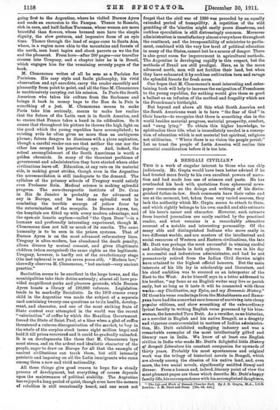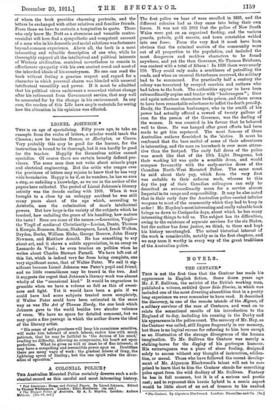A BENGALI CIVILIAN.•
Tars is a work of singular interest to those who can skip judiciously. Mr. Gupta would have been better advised if he had trusted more freely to his own excellent powers of narra- tion and had made less use of scissors and paste. He has overloaded his book with quotations from ephemeral news- paper comments on the doings and writings of his distin- guished father-in-law. Such comments have their value and use at the moment, but, taken from very varied sources, they lack the authority which Mr. Gupta seems to attach to them, and which rightly belongs to his own candid and able estimate of his hero's career and character. However, such extracts from hurried journalism are easily omitted by the practised reader, and what remains is a remarkably attractive account of a notable and interesting personality. Of the many able and distinguished Indians who move easily in two different worlds, and are masters of the intellectual and social resources of Western and Eastern civilizations, the late Mr. Dutt was perhaps the most successful in winning cordial and admiring friends in both spheres. He was in his day a, successful and industrious administrator, and had he not prematurely retired from the Indian Civil Service might have attained to the highest official honours. But the main interests of his life lay in scholarship and literature, and his chief ambition was to succeed as an interpreter of the East to the West. As he himself says in a letter addressed to his brother, "my fame as an English writer may live or perish early, but so long as it lasts it will be connected with •three works—my Civilization, my Epics, and my Economic History." Of these his verse renderings from the Mahabharata and Ram a- yana have had the somewhat rare honour of surviving into cheap popular editions, and show something of the extraordinary lyrical faculty in writing English verse possessed by his kins- woman, the lamented Torn Dutt. As a versifier, as an historian, as a novelist in English and his native Bengali, as a doughty and vigorous controversialist in matters of Indian administra- tion, Mr. Dutt exhibited unflagging industry and was a remarkable exemplar of the most intellectually gifted and literary race in India. We know of at least one English civilian in India who made Mr. butt's delightful little History of Bengali Literature his constant companion for upwards of thirty years. Probably his most spontaneous and original work was the trilogy of historical novels in Bengali, which are already among the classics of his native land, and, even more, the two social novels, significantly entitled Samaj and Sansar. From a human and, indeed, literary point of view the most pleasant pages are those which describe Mr. Dutt'shappy family life, his correspondence with his accomplished daughters, • The Life and Work of Ramesh Chunder Butt. By J. N. Gupta, 31.A., LC.S. London: J. M. Dent and Sons. [10s. 6d. net.]
of whom the book provides charming portraits, and the letters he exchanged with other relatives and familiar friends. From these we have to restrain a temptation to quote. Those who only knew Mr. Dutt as a strenuous and versatile contro- versialist will here find a sympathetic and competent account of a man who in his domestic and social relations was fortunate beyond common experience. Above all, the book is a most interesting and valuable description of one who, while he thoroughly enjoyed all the intellectual and political interests of Western civilization, contrived nevertheless to remain in affectionate sympathy with his own ancient creed and most of the inherited ideals of his countrymen. No one can read the book without feeling a genuine respect and regard for a character in which personal charm was blended with unusual intellectual versatility and power. If it must be admitted that his political views underwent a somewhat violent change after his retirement from Government service, that may well be accounted for by the change in his environment. In any case, the readers of this Life have ample materials for seeing how the alteration in his opinions was effected.







































 Previous page
Previous page